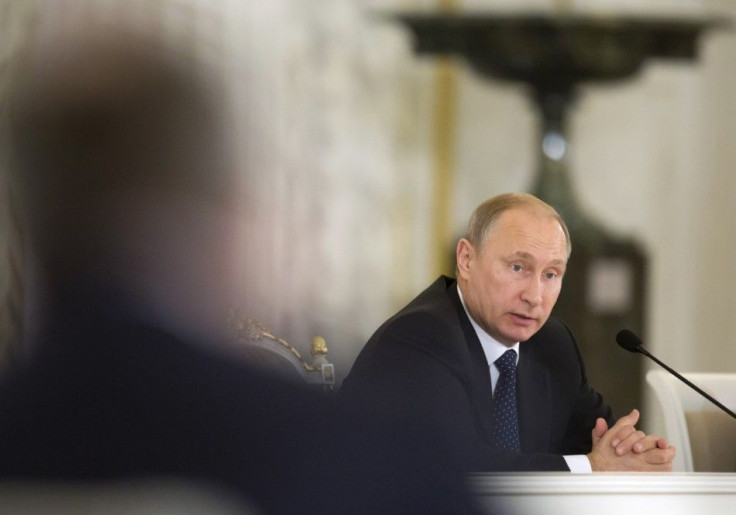Russia Is A Threat To US, Senior Admiral Tells Senate Panel: Putin Confirms Russia Was Thinking Nuclear Retaliation For Any Attack Over Crimean Annexation

A senior Admiral of the U.S Navy has warned that Russia’s belligerence poses a substantial threat to the safety of America. Admiral William Gortney, commander of the North American Aerospace Defense Command was sharing his views on Russia, before the Senate Armed Services Committee.
The comments of the Admiral mark the rising trust deficit between the U.S. and Russia, which was further buttressed by the comments made by President Vladimir Putin on Sunday that Russia was ready for a nuclear striket, after it feared an attack over the annexation of Crimea from Ukraine, in March 2014.
The Admiral listed many instances of Russia’s aggressive posturing. “In 2014, there was a notable increase in military assertiveness on the world stage, including approaches to the homelands,” he told the committee. According to the Admiral, Russian heavy bombers flew more out-of-area patrols in 2014 than in any year, after the Cold War. Russian forces also displayed improved interoperability between long-range aviation and other elements. They included air and maritime intelligence collection platforms for monitoring North American Aerospace Defense Command.
The Admiral observed that Russian patrols had a dual purpose-- training of air crews, and a show of Moscow’s global reach and a message of displeasure with Western policies especially on Ukraine. The Admiral mentioned that most noticeable interceptions by NATO took place near Russian borders over the Baltics. There were at least 100 interceptions of Russian military until November, which showed a hike of three times, since 2013.
Presence of Russian Ships
In November 2014, EU state Portugal chased a Russian ship out of its waters, even though Russia claimed it was conducting “marine research.” Portugal acted when the ship was sighted almost 14 miles from the coast. He noted that Russian warships also entered the English Channel in November, 2014. The Russian media outlet RIA played it down saying the fleet “passed through the Strait of Dover” and entered “international waters in the Seine Bay to wait for a storm to pass.” That the Russian crew participated in exercises was confirmed by the Northern Fleet though NATO denied it later.
The Admiral expressed the concern at Russia’s muscle flexing and its goal of deploying long-range, armed cruise missiles with ever increasing launch distances on heavy bombers, submarines and surface combatants. According to Gortney, if these trends were to persist, over time NORAD will be at risk in defending North America against Russian air, maritime, and cruise missile threats.
The latest to rattle the U.S. is, Russia’s demand on Vietnam for allowing the use of Cam Ranh Bay airfield, which was a U.S. base during the Vietnam War. It was made a Soviet naval base later and had been in use until 2002. The U.S. has asked Vietnam to decline Russia’s request to use the base for refuelling its aircraft despite Russian Foreign Ministry claim that the air force will comply “with international norms and bilateral agreements.”
Putin’s Reaction
Meanwhile, president Putin, showed no regrets on Crimea's takeover. Rather, he blamed the U.S. for escalating problems in Ukraine and also made a new disclosure that Russia was fearing an attack by the West, at the height of Ukraine crisis and was prepared for a nuclear alert. Putin made these comments in an interview aired on Russian state TV, on Sunday night. Mr Putin said: “We were ready to do this ... (Crimea) is our historical territory. Russian people live there. They were in danger. We cannot abandon them.”
Mr Putin also revealed that while taking control of Crimean peninsula, Russia had deployed K-300P Bastion coastal defence missile “in a way that made them seen clearly from space” as a deterrent to the perceived threat of attack from the West.
(For feedback/comments, contact the writer at kalyanaussie@gmail.com)





















